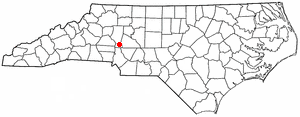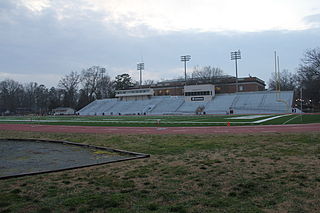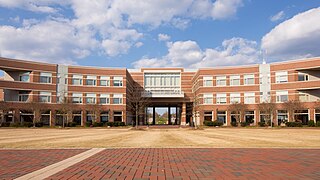
North Carolina State University is a public land-grant research university in Raleigh, North Carolina. Founded in 1887 and part of the University of North Carolina system, it is the largest university in the Carolinas. The university forms one of the corners of the Research Triangle together with Duke University in Durham and the University of North Carolina at Chapel Hill. It is classified among "R1: Doctoral Universities – Very high research activity".

Mooresville is a large town located in the southwestern section of Iredell County, North Carolina, United States, and is a part of the fast-growing Charlotte metropolitan area. The population was 50,193 at the 2020 United States Census making it the largest municipality in Iredell County. It is located approximately 25 miles (40 km) north of Charlotte.

The University of North Carolina at Charlotte is a public research university in Charlotte, North Carolina. UNC Charlotte offers 24 doctoral, 66 master's, and 79 bachelor's degree programs through nine colleges: the College of Arts + Architecture, the College of Liberal Arts & Sciences, the Belk College of Business, the College of Computing and Informatics, the Cato College of Education, the William States Lee College of Engineering, the College of Health and Human Services, the Honors College, and the University College.

The Research Triangle, or simply The Triangle, are both common nicknames for a metropolitan area in the Piedmont region of North Carolina in the United States, anchored by the cities of Raleigh and Durham and the town of Chapel Hill, home to three major research universities: North Carolina State University, Duke University, and University of North Carolina at Chapel Hill, respectively. The nine-county region, officially named the Raleigh–Durham–Cary combined statistical area (CSA), comprises the Raleigh–Cary and Durham–Chapel Hill Metropolitan Statistical Areas and the Henderson Micropolitan Statistical Area. The "Triangle" name originated in the 1950s with the creation of Research Triangle Park, located between the three anchor cities and home to numerous high tech companies.

Bank of America Stadium is a 74,867-seat football stadium located on 33 acres (13 ha) in uptown Charlotte, North Carolina, United States. It is the home facility and headquarters of the Carolina Panthers of the National Football League and Charlotte FC of Major League Soccer. The stadium opened in 1996 as Ericsson Stadium, with Swedish telecom company LM Ericsson initially holding the naming rights. In 2004, Charlotte-based financial services company Bank of America purchased the naming rights under a 20-25-year agreement at $140 million. Former Panthers president Danny Morrison called it a "classic American stadium" due to its bowl design and other features.

Alan Dennis Kulwicki, nicknamed "Special K" and the "Polish Prince", was an American auto racing driver and team owner. He started racing at local short tracks in Wisconsin before moving up to regional stock car touring series. Kulwicki arrived at NASCAR, the highest and most expensive level of stock car racing in the United States, with no sponsor, a limited budget and only a racecar and a borrowed pickup truck. Despite starting with meager equipment and finances, he earned the 1986 NASCAR Rookie of the Year award over drivers racing for well-funded teams.

The Biocomplexity Institute of Virginia Tech is a research organization specializing in bioinformatics, computational biology, and systems biology. The institute has more than 250 personnel, including over 50 tenured and research faculty. Research at the institute involves collaboration in diverse disciplines such as mathematics, computer science, biology, plant pathology, biochemistry, systems biology, statistics, economics, synthetic biology and medicine. The institute develops -omic and bioinformatic tools and databases that can be applied to the study of human, animal and plant diseases as well as the discovery of new vaccine, drug and diagnostic targets.

The NASCAR Hall of Fame, located in Charlotte, North Carolina, honors drivers who have shown expert skill at NASCAR driving, all-time great crew chiefs and owners, broadcasters and other major contributors to competition within the sanctioning body.

Richardson Stadium is a 4,741-seat multi-purpose stadium in Davidson, North Carolina. It is home to the Davidson College Wildcats football, lacrosse, and track and field teams. The stadium incorporates both Stephen B. Smith Field and Irwin Belk Track. It has also hosted the NCAA Men's Soccer Championship on three occasions from 1992 to 1994. Every autumn the stadium acts as the start and finish of the Davidson freshman Cake Race, where incoming students run a course around the college in competition for cakes baked by inhabitants of the local community. The facility opened in 1926 after being donated to the college by Lunsford Richardson Jr., Davidson class of 1914, and his brother Henry Smith Richardson, Davidson class of 1906, in memory of their father, Lunsford Richardson Sr., Davidson class of 1875. It was later renovated in 1998 and again in 2005 with the latter providing upgraded amenities including expanded seating, a new press box, weight room, and visitor's locker room.

The North Carolina Research Campus (NCRC) is a public-private research center in Kannapolis, North Carolina, United States. The Campus was envisioned by David H. Murdock, owner of Dole Food Company and Castle and Cooke, Inc., as a center for improving human health through research into nutrition and agriculture. The campus was formed and operates as a partnership with the State of North Carolina and the University of North Carolina system.

The Main Campus is the primary campus of North Carolina State University, located in Raleigh, North Carolina, US, inside the Beltline. Notable features of Main Campus include the Bell Tower and D. H. Hill Library. The campus is known for its distinctive red brick buildings, sidewalks, plazas, and sculptures; some are dotted with decorative brick mosaics. University Plaza is nicknamed "The Brickyard" because it is mostly a flat, open, bricked area.

Centennial Campus is a research park and educational campus owned and operated by North Carolina State University in Raleigh, North Carolina, United States. Composed of two locations, the 1,334 acres (5.4 km2) property provides office and lab space for corporate, governmental and not-for-profit entities, in addition to providing space for 75 university research centers, institutes, laboratories and departmental units. Currently, 5,000,000 sq ft (460,000 m2) of constructed space has been built. Upon completion, Centennial Campus is anticipated to have 9,000,000 sq ft (840,000 m2) of constructed space.
North Carolina State University College of Veterinary Medicine is an American educational institution located in Raleigh, North Carolina that offers master's and doctorate-level degree programs; interdisciplinary research in a range of veterinary and comparative medicine topics through centers, institutes, programs and laboratories; and external engagement through public service programs and activities.
On September 21, 2007, the graduate programs in North Carolina State University's College of Management were brought under one name - the Jenkins Graduate School of Management. The programs were named in honor of Benjamin (Ben) P. Jenkins, III, a 1968 graduate of the university and vice-chairman and president of the General Bank at Wachovia Corporation.
Curb Museum for Music and Motorsports is a museum about music and NASCAR racing, both reflecting the business interests and passions of owner Mike Curb. The museum is located at 600 Dale Earnhardt Blvd in Kannapolis, North Carolina.

The Piedmont Atlantic Megaregion (PAM) is a neologism created by the Regional Plan Association for an area of the Southeastern United States that includes the Atlanta, Birmingham, Charlotte, Memphis, Nashville, Research Triangle (Raleigh-Durham), and Greensboro-Winston-Salem-High Point metropolitan areas. The megaregion generally follows the Interstate 85/20 corridor. According to Georgia Tech, PAM represents over 12 percent of the total United States population and covers over 243,000 square miles (630,000 km2) of land.

The Charlotte metropolitan area, sometimes referred to as Metrolina, is a metropolitan area of the U.S. states of North and South Carolina, within and surrounding the city of Charlotte. The metropolitan area also includes the cities of Gastonia, Concord, Huntersville, and Rock Hill as well as the large suburban area in the counties surrounding Mecklenburg County, which is at the center of the metro area. Located in the Piedmont, it is the largest metropolitan area in the Carolinas, and the fourth largest in the Southeastern United States. The Charlotte metropolitan area is one of the fastest growing metropolitan areas in the United States.

McColl–Richardson Field at Jerry Richardson Stadium is a college football stadium in University City, Charlotte, North Carolina, United States and the home field of the Charlotte 49ers football team representing the University of North Carolina at Charlotte. The team became a Football Bowl Subdivision member in 2015 and competes in Conference USA.





















